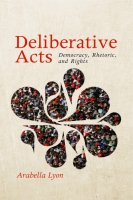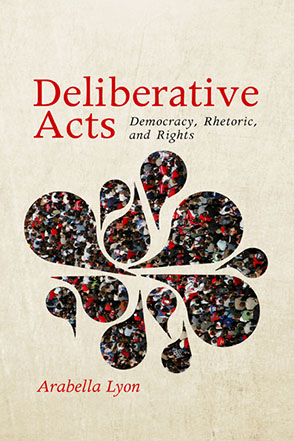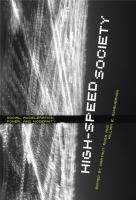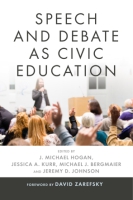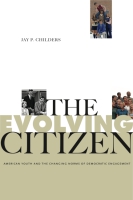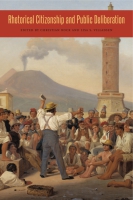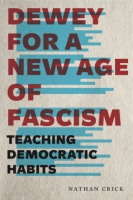Deliberative Acts
Democracy, Rhetoric, and Rights
Arabella Lyon
“Deliberative Acts provides a trenchant critique of the theoretical premises of persuasion, argumentation, and identification dominating Western rhetoric. Arabella Lyon delivers a versatile theory of deliberation as a formative act wherein differences are generative and constitutive of relational agency. Lyon focuses on paradigmatic human rights struggles to reveal the limits of liberal models of democracy and their diminishment of interpretive differences. Her astute analysis of human rights as relationships shows deliberation’s ability to transform our understanding of cross-cultural rights practices. This book is relevant for all interested in how globalization continues to shift our understanding of rights and of deliberation itself.”
- Media
- Description
- Reviews
- Bio
- Table of Contents
- Sample Chapters
- Subjects
Deliberative Acts is the winner of the 2014 Rhetoric Society of America Book Award
“Deliberative Acts provides a trenchant critique of the theoretical premises of persuasion, argumentation, and identification dominating Western rhetoric. Arabella Lyon delivers a versatile theory of deliberation as a formative act wherein differences are generative and constitutive of relational agency. Lyon focuses on paradigmatic human rights struggles to reveal the limits of liberal models of democracy and their diminishment of interpretive differences. Her astute analysis of human rights as relationships shows deliberation’s ability to transform our understanding of cross-cultural rights practices. This book is relevant for all interested in how globalization continues to shift our understanding of rights and of deliberation itself.”
“Cross-cultural interactions in the global era call for pluralistic thinking, engagement with situated difference, and keen awareness of one’s own discursive blind spots. Thanks to Arabella Lyon, we now have an insightful and compelling framework for enacting such interactions and performing deliberative acts that privilege contingency, transformation, and initial moments of recognition.”
“Arabella Lyon’s Deliberative Acts: Democracy, Rhetoric, and Rights is an important and exciting work of rhetorical theory that effectively challenges a central paradigm of rhetoric—persuasion—and argues for a concept of deliberation that is rooted in its performance as a speech act. I was repeatedly impressed by Lyon’s ability to engage the political discourse she analyzes and theorizes. She accomplishes a rare thing: she develops a theory nuanced and powerful enough to provide genuine insight into the complicated and ongoing speech practices that shape and reshape individuals, cultures, and political orders. She does justice to the dynamic interaction between speaker and interlocutor in ways that few works of rhetorical theory have managed to do. The power of Lyon’s theory is borne out in her very helpful analyses of the construction of the abuse of al-Obeidi, the misrepresentation of the Chinese policy of one child, and the complex role of performative speech in the history of the women’s suffrage movement. Her analyses exemplify the dynamic, evolving, and open-ended process of deliberation that she theorizes. This book will change and invigorate the ways we think and speak about the nature and consequences of speech as political action.”
“Arabella Lyon’s Deliberative Acts is an exceptional treatment of human rights rhetoric with consequential ramifications for public deliberation and democratic cultures. Lyon offers readers overlapping concepts of deliberative ‘performance, performatives, and performativity’ as alternatives to the traditional emphasis on persuasion, identification, and consensus, while advancing substantive arguments for dealing with human differences in diverse and transnational contemporary life. Incisive and lucid, Deliberative Acts ranges widely across major philosophical perspectives on deliberative theory, considering classical sources such as Aristotle and Confucius, as well as twentieth-century writers such as Hannah Arendt, Kenneth Burke, John L. Austin, Judith Butler, and several accomplished feminist epistemologists and social justice theorists. Lyon’s sustained engagement with these intellectuals’ works scrutinizes their limitations respectfully, salvaging useful concepts and insights along the way, and places them in dialogue with each other to generate alternatives.”
“Arabella Lyon’s Deliberative Acts challenges the central assumptions of deliberative rhetoric and offers exciting new ways of reading, responding to, and creating democratic forms of life. This absorbing book analyzes human rights discourses from the perspective of performance theory, emphasizing issues of recognition, difference, and agency. Lyon develops her analysis by examining a wide range of cases: missing women in Asia, the Rigoberta Menchú controversy, and debates about women’s studies in the United States, Uzbekistan, China, and Japan.”
“In Deliberative Acts, Arabella Lyon presents a cogent argument for the performative role of deliberative rhetoric in addressing the problem of human rights. She powerfully advocates what might be called a rhetorical hermeneutics of narrative aimed at achieving a more complex recognition of others as a ground for global human rights deliberation leading to political action.”
“Lyon’s critique of deliberation in human rights discourse, particularly her departure from identification as a valid tool in persuasion across difference, is important and should be a foundational one for those of us working in rights discourse because it cuts to the very methodology on which rights claims, particularly within official channels like the UN, have historically been predicated.”
“Lyon’s illustrative case studies and vital reconstitution of key rhetorical concepts provide essential critical frameworks for scholars and teachers working at the intersection of rhetoric and human rights studies and, more broadly, those interested in the performance of democracy.”
“Coming out of a background of attempting to introduce conceptions of universal human rights—especially the rights of traditionally subordinate or marginalized groups such as the outsider, the stranger, women, or the handicapped—into pre‐modern, often patriarchal societies, Lyon sees rhetoric more as a species of narrative hermeneutic or performative art that is on‐going, rather than reaching a predetermined end or being restricted to a single issue, that is open to contingency and the intrusion of unexpected topics as important for the other side, in which the ‘positions’ of both sides must be ready and open to evolution and transformation almost beyond recognition.”
Arabella Lyon is Associate Professor of English at the University at Buffalo. Her 1998 book Intentions: Negotiated, Contested, and Ignored (Penn State) won the W. Ross Winterowd Award from the Association of Teachers of Advanced Composition.
Contents
Acknowledgements
Introduction: Deliberation in the Global Era
1 Defining Deliberative Space: Rethinking Persuasion, Position, and Identification
2 Performative Deliberation and the Narratable Who
3 Narrating Rights, Creating Agents: Missing Women in the U.S. Media
4 The Beauty of Arendt’s Lies: Menchú’s Political Strategy
5 Voting like a Girl: Declarations, Paradoxes of Deliberation, and Embodied Citizens as a Difference in Kind
Notes
Works Cited
Index
Introduction:
Deliberation in the Global Era
Deliberative democracy, of course, attempts to formulate an ideal rational/political structure, one which is both normative and prescriptive: it says that rational debate among equal actors ought to constitute the process of democratic decision making.
—Benedetto Fontana, Cary J. Nederman, and Gary Remer, Talking Democracy
America, this republic, the democracy in which we are, is a living thing which cannot be contemplated or categorized, like the image of a thing which I can make; it cannot be fabricated. It is not and never will be perfect because the standard of perfection does not apply here. Dissent belongs to this living matter as much as consent does. The limitations on dissent are the Constitution and the Bill of Rights and no one else. If you try to “make America more American” or a model of democracy according to any preconceived idea, you can only destroy it.
—Hannah Arendt, “The Ex-Communists”
Shall we speak of Abu Ghraib and torture; shall we educate the children of illegal immigrants; shall we guarantee health care for all or for most; shall we intervene in the governance of other nations; shall we ban the hijab (head scarf), medicinal marijuana, and prayer in the schools; shall we find one hundred million missing women, the lost boys of Africa, and los desaparecidos (the disappeared)? Virtually every page of a good newspaper asks citizens to consider matters of human rights: we are asked to deliberate on rights every day. In response to the significance of rights talk within politics and the world order, both international and civil rights have grown as areas of academic inquiry. Search the keyword “human rights” in a research university library, and over twelve thousand books come up, the vast majority published since 1994. Human rights, exemplified by the Universal Declaration of Human Rights (UDHR) of 1948, have become a key discourse in international politics after the Cold War, and they have become a key analytic in academic inquiry in fields from law to social work. The UDHR and the proliferating supporting documents have created what Michael Ignatieff calls an advocacy, juridical, and enforcement revolution (5–12). Hence, in the transnational order emerging after the Cold War, rights have become the grounds for questioning the legitimacy of laws and nation-states, a legitimacy increasingly tied to democratic elections and popular representation of rights. In the struggles for representation and legitimation, human rights rhetoric has become a key strategy in political deliberations both nationally and internationally.
The political forces turned loose by human rights talk, even when rights are imagined as universal, are not committed to universalism but rather to competition for dominance by the ideologies and cultures made manifest through our globalization. The clashes call forth complicated deliberations, deliberations whose complexity troubles earlier theories of persuasion, dialogue, reasoned argument, and identification. One might consider briefly the 2001 struggle to claim the rights of Afghan women. Seeking to expand U.S. dominance in the region, then President Bush linked the Taliban to the abuse of Afghan women, joining the U.S. rights organization The Feminist Majority in the position that the Afghan state did not represent women. In response to the process of (mis)representing Afghan women and co-opting their agency, the Afghan feminist group Revolutionary Association of the Women of Afghanistan (RAWA), founded in 1977, criticized not only U.S. governmental imperialism but also that of U.S. feminism. Here three players claimed a legitimate role for themselves in representing Afghan women (a representative of the U.S. government, a U.S. feminist organization, and an Afghan feminist organization), but these three claimants are not the only possible claimants here. The Afghan government, individual Afghan women, and international women’s groups, such as Women Living Under Muslim Laws, come to mind immediately. All claimed to represent Afghan women, even though each of these claimants represents very different cultural positions, definitions of (Afghan) women, and relationships to rights. The multiple disputing interlocutors create tensions around religious rights and civil rights, individual and cultural rights, and international and local interpretations of rights as well as colonialism and liberation. In the twenty-first century, human rights deliberations particularly demonstrate the cultural conflicts and competing claims in global deliberations because rights are quintessentially cross-cultural engagements in a human world increasingly recognized as multicultural.
Rhoda E. Howard-Hassmann characterizes globalization as the “second great transformation,” an evolving phenomenon potentially as transformative as what Karl Polanyi called the great transformation from an agricultural to industrial Europe. Contemporary globalization is moving the whole world to industrialism, entailing a myriad of changes. The transnational circulation of people, ideas, and capital places new pressures on deliberative theory, but these pressures are not new to deliberation. Rather, they have been acknowledged inadequately within deliberative theory, which clings to models formed under earlier power elites. Only now, in new frames of global capital, transnational networks, and weakened nation-states, do the limitations of earlier theories become clearer. Consider that existing nation-states number a scant two hundred, but they are home to five thousand identifiable ethnic groups; hence, even within most established nations, multicultural citizenship is unavoidable (Kymlicka 196). Given historically close proximity, ethnic groups necessarily deliberated over resources, capital, ideas, and relationships, but the ruling patterns of earlier elites overshadowed these local engagements across differences, and thus the elites’ understanding of deliberation dominated historically. The significance of multicultural deliberations has recently increased owing to changes in relationships among cultures, capital, and nation-states, and as a consequence of these changing structural relationships—most particularly the destabilization of the Westphalian state system—competing ideas of justice and the good vie more publicly. As Nancy Fraser observes, “[G]lobalization is changing the way we argue about justice” (Scales 12).
Although this book’s primary purpose is to develop a theory of performative deliberation—a theory of how performatives (speech acts), performances, and performativity produce citizens, events, and politics—its examples and case studies involve human rights advocacy, representations, and deliberations for two reasons. First, human rights deliberations are difficult because they are deliberations across extreme difference, troubled by recognitions, competing values, and political hegemonies. As Julietta Hua writes, the “problematic of difference lies at the crux of human rights debates around how to define universal principles and how to represent the varied victims of abuses” (2). Depicting universalism as a limited concept of modernity, she argues that the issue of difference is deeper than accurate representation; rather, the significance of difference lies at “the moment of the conferring of subjectivity and humanity” (2), for in that act of conferring a subject, a human, becomes legible. Although representation helps in conferring rights subjectivity, the recognition of the rights subject and the recognition of difference precede representation, she argues, making issues of rights less questions of representation and more ones of onto-epistemology. Thus they are issues that inquire into the nature of being and the knowledge of other minds. Even if we see recognition and representation as simultaneous, the difficulty of recognizing and representing the subject of rights defeats facile assumptions of shared values, identities, and rules of reason, procedure, and judgment in analyses of human rights deliberations. Hua might say that for Afghan women, the issue is deeper than who represents them and how. The issue is one both requiring a situated knowledge of their lives and a legible, active engagement with the women as subjects of rights, sharing rights claims and yet distinct from other subjects of rights. Since human rights deliberations require examinations of both being and situated knowledge for the many coming to action, an action potentially transformative of being and knowledge, they are difficult deliberations.
As globalization brings culturally different peoples together in institutions within and beyond the nation-state, deliberations become more visibly concerned with difference, differences not settled quickly through persuasion, identification, or reasoned argument. Confronted with competing claims of justice, calls for recognition, and the struggle over the appropriate means to respond to grave injustice, global citizens and their representatives are regularly asked to understand alien cultural traditions, assess the representations and structural causes of rights violations, and articulate responses to conflicting rights claims, responses that may transform the being and knowledge of all participants. In responding to rights conflicts, citizens are asked to deliberate, to recognize interlocutors, to comprehend their competing claims, and to weigh definitions of the issue and the consequences of their decisions on people whom they have never seen. Furthermore, they have little sense of how to intervene effectively, because the terms of judgment and application may be alien, perhaps incommensurable with their cultural assumptions, and yet in the service of peace and the planet, global citizens cannot reject difference as disruptive and are required to engage it as diversity. Even if there is a general agreement on action—say, the rejection of the 2011 Mississippi referendum on personhood at conception—there may be little agreement on what that action means and how that action crosses cultures. Voters may have rejected it for reasons of women’s right to autonomy, desire for self-determination through in vitro fertilization, or confusion over its implications. Even in shared action, difference remains, making rights actions multivocal and heterogeneous at their core.
Sally Engle Merry characterizes rights decision-making as translations for rights are in need of local interpretation. She argues that human rights declarations need to be remade into the vernacular in such a way that local agents and advocates concerned with histories and cultural contexts can respond to visions of a unified modernity. In her analysis of how violence against women might be controlled, she observes, “Human rights documents create the legal categories and legal norms . . . but the dissemination of these norms and categories depends on NGOs seizing this language and using it to generate public support or governmental discomfort” (71). The difficult remaking of discourses to reflect the local is a quintessentially a performative act of deliberative rhetoric. Merry’s vision of NGOs seizing and translating legal norms into local language extends the process of rights deliberation beyond accurate translations to founding acts of ownership, and this suggests the second reason for my focus on human rights deliberations: the deliberative nature of rights themselves. Although there are definitions of rights based solely in their claims to universalism, human rights law, or the normative force of laws, these are not the only approaches to understanding human rights. Singular interpretations of documents and limited recognitions of difference particularly trouble rights talk. Consequently, universal claims to human rights have been soundly critiqued. From its inception, the UDHR has been haunted by the tension between universalism and cultural relativism, its rights analyzed as either innately human or culturally relative (i.e., Western). Even in its initial drafting, participants such as René Cassin and P. C. Chang attempted to avoid metaphysical and natural foundations and to allow for cultural differences.
To avoid a dogmatic understanding of human rights as law, a textual truth, or a universal standard of what it means to be human, throughout the book, I consider rights as performative deliberative practices leading to the constitution of a new form of life. Rights are community decisions developed through a wide range of deliberative practices. Yes, there are human rights laws, but as Joseph Slaughter notes, they are “a notoriously feeble legal regime” (24). In fact, Amartya Sen stresses their lack of legal standing, arguing that their (legal) existence is less important than their “really strong ethical pronouncements as to what should be done” (Idea 357). Inherent in appreciating the force of rights discourse as ethical pronouncements, or as cultural norms, is the understanding of rights as defining relationships among people. Even at the beginning of the twentieth century, the jurist Wesley Newcomb Hohfeld argued that rights were not absolutes; rather, they were relationships between people based in claims. In the tradition of relationship, rebutting rights as universal ethics, true or false constatives, or ethical pronouncements, Beth Singer characterizes rights as decisions based in cultural norms internally formed in reciprocal relationships, where community members both claim and respect similar rights. In placing rights in a “normative community” and conceiving rights as justified through the requirements of social interaction, Singer presents rights as “modes of behavior, institutionalized ways in which the members of a community behave toward one another and which must be learned” (35). Rights, then, are not universals, declarations, religious demands, or natural to being human, but instead are acts of participation formed in conversations among community members and carried out in repeated behaviors or actions which re-enforce them as norms. When rights are considered as relationships defined in behaviors, their deliberative and performative aspects become all the more significant to understanding the meaning of right and the nature of deliberation. As political performances, more so than ethical decisions, human rights become a paradigm of performative deliberation. Indeed, given the basis of rights in learned behaviors and actions that may change cultural norms and hegemonies, rights discussions and enactments quintessentially demonstrate the performative nature of deliberation.
If rights are seen as relationships defined through speech acts and practices, concerned with the contingencies of being and situated (epistemic) discourses, one might imagine rights as ongoing politicohistorical projects, designed through local deliberations. As norms—that is, social coordination or “general rules of action and institutional arrangements” (Benhabib, “Toward” 70)—human rights are subject to subscription, and that subscription, even choice, is locally made. As norms, they do not describe facts, the world where humans act, but make claims about human dignity which, in turn, call upon us to subscribe to those norms and then oblige us and guide our actions. Abdullahi Ahmed An-Na’im observes, “[S]ince people are more likely to observe normative propositions if they believe them to be sanctioned by their own cultural traditions, observance of human rights standards can be improved through the enhancement of the cultural legitimacy of those standards. The claim that all the existing human rights standards already enjoy universal cultural legitimacy may be weak from a historical point of view in the sense that many cultural traditions in the world have had little say in the formulation of those standards” (“Toward” 20).
Following An-Na’im, Deliberative Acts conceives rights as culturally sanctioned through historically based translation, negotiation, and deliberation, formed and performed in dialogue. In doing so, I acknowledge the limitation of dialogue, hearing Hua’s warning that “the values validated through cross-cultural dialogues are exactly those values that enable cross-cultural dialogue” (16). Hua would require us to acknowledge an onto-epistemological privilege to certain perspectives, perspectives that may place Western values at the core of rights deliberation. Acknowledging her cautions on dialogue, in later chapters, I demonstrate more robust dialogues and imaginative translations of terms and thus suggest that there is the possibility of dialogic and diverse engagement within politicohistory. Adequately critiqued, deliberation remains our best possibility for communication in the state of diversity. Furthermore, rights as conceived in this book are understood as quintessentially political, subject fully to political pressures from self-interest, historical privilege, and economic license. Since even what is claimed as universal is dependent on subscription, built upon what An-Na’im calls “internal cultural discourse and cross-cultural dialogue” (“Introduction” 3; emphasis in original), it is urgent that citizens understand the nature of rights deliberations in ways that move away from dichotomies of universalism and cultural relativism, politicohistory and onto-epistemology, enlightened savior and brutal (tribal) savage.
In claiming deliberation’s force in global politics, one should neither discard the shawl of skepticism nor deny a crisis of confidence about the human capacity for political judgment. Deliberation is an act fraught with hierarchal power, contingency, and manipulation. Human rights deliberations have been demonstrably subjected to shameless strategy and instrumentalism, and they often are used to promote the self-interests of nations, communities, and dark powers lacking respect for human dignity and difference. As Wendy Hesford observes, “human rights are never pure, or culturally and politically unencumbered” (203). Even so, despite the dark side of rights advocacy, the century is marked by falling poverty rates, decreasing world violence, and increasing voting rights. Human rights talk has turned loose a myriad of complex, contradictory, and constituting forces, both because of and despite being “situated as a universal and uncontestable ethics of cross-cultural relations” (Whitlock 118). To deliberate in responsible and effective (if not ethical) ways, interlocutors cannot discard skepticism, nor can they work within a single interpretive frame. To that end, scholars struggle to describe the workings of rights deliberation.
Using the powerful purposes of human rights deliberations, Deliberative Acts develops a new approach to deliberation, focusing on performatives, performances, and performativity as transformative in the contingency and diversity of deliberations. Rather than conceiving deliberation within the frameworks of persuasion, identification, or procedural democracy, deliberation (dramatistically) is reoriented to its initiating moment of recognition, a moment in which interlocutors are constituted in relationship or position to each other and so may begin constructing a new lifeworld. Recognition, as demonstrated in performance and performative, engages interlocutors in shared acts and agencies—felicitous and infelicitous, cooperative and agonistic—but whether the utterances are cooperative or agonistic, they still act upon the event and the interlocutors. In offering a theory of performative deliberation, Deliberative Acts provides the means to approach questions such as these: How do diverse peoples recognize and respond to each other while respecting differences of being and knowing? Can citizens recognize and engage each other to create global justice, or are they trapped in home discourses, demanding institutions, and material, historical, and cultural circumstances that primarily benefit elites? What are their responsibilities to each other? How do mainstream and marginal rights communities, even within the same nation-state, articulate and balance their rights norms? How does a thinking and located citizen weigh the normative imperatives of rights, her home culture, and her nation-state to make decisions about her prospects and those of others? How can she do this in multicultural situations in harmony or conflict? Are there resources within traditional deliberative theory that might help explain contemporary decision making? Or are Western traditions of deliberation, as exemplified in the Athenian polis and nineteenth-century civil rights advocacy, inadequate to describing and assessing the political rhetoric of the twenty-first century? What is the nature of a deliberative act, its production, and its reception?
Mailing List
Subscribe to our mailing list and be notified about new titles, journals and catalogs.
